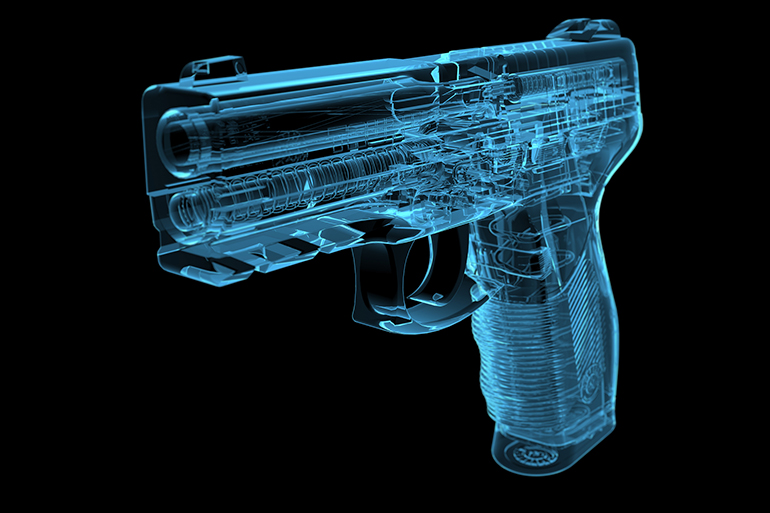
Chethan Sathya, a pediatric trauma surgeon and the director of Northwell Health’s Center for Gun Violence Prevention, pointed out that those topics used to be contentious for physicians to talk about. To treat guns as a public-health issue, “we can’t be uncomfortable having conversations,” he told me. But doctors have more power in this situation than they do in others. They might tell someone with diabetes to stop having soda three times a day, but they can’t literally take soda away from a patient. With guns, they might be able to.
In states with extreme-risk laws, if a health-care provider believes that their patient poses an immediate threat to themselves or others, they can work with law enforcement to petition the court to temporarily remove someone’s firearms; a handful of states allow medical professionals to file these petitions directly.
There are many people “across America right now who own guns and won’t come to counseling, because they don’t want their rights taken away for real or imagined reasons,” Jake Wiskerchen, a mental-health counselor in Nevada who advocates for such patients, told me. They worry that if their doctor includes gun-ownership status in their medical record, they could be added to a hypothetical national registry of firearm owners. And if questions about guns were to become truly routine in a doctor’s office—such as on an intake form—he said owners might just lie or decide they “don’t want to go to the doctor anymore.”
Physicians accordingly choose their words carefully. They talk about preventing firearm injury instead of gun violence—both because the majority of gun deaths are suicides, not homicides, and because it’s a less loaded term. Telling a diabetic patient to cut back on soda might work, but people “are not just going to throw their guns in the trash,” [emergency psychiatrist Amy] Barnhorst, of UC Davis, told me. “There’s a lot more psychological meaning behind firearms for people than there is for sodas.”
— Nancy Walecki in The Doctor Will Ask About Your Gun Now

5 Responses
“In states with extreme-risk laws, if a health-care provider believes that their patient poses an immediate threat to themselves or others, they can work with law enforcement to petition the court to temporarily remove someone’s firearms; a handful of states allow medical professionals to file these petitions directly.”
That’s not accurate.
In ALL 50 states there are already laws on the books (have been for almost 100 years now) that let anyone, including a “health-care provider”, who believes someone “poses an immediate threat to themselves or others” to go to law enforcement or petition a court to “remove someone’s firearms” or any other thing they might use to pose “an immediate threat to themselves or others” PLUS also take them for mental health evaluation or confinement. Its done hundreds of times around the country every day. Its just called different things instead of ‘red flag’ or ‘extreme-risk laws’.
For example, in Mississippi (one of the states the anti-gun claims that don’t have such laws) they have ‘Mississippi Code Title 41 – Public Health – Chapter 21 – Individuals With Mental Illness or an Intellectual Disability Persons in Need of Mental Treatment – § 41-21-67. Person to be taken into custody; community mental health center as first point of entry for pre-evaluation screening and treatment; referral to crisis intervention team; appointment of examining physicians, or physician and psychologist, nurse practitioner or physician assistant; appointment of attorney; emergency patient status; notification to Department of Child Protection Services of possible danger to minor child under certain circumstances” — and it doesn’t even need a judge, all a person has to do is file an affidavit with the chancery clerk.
Although for Mississippi, the current code is codified into that section its actually an outgrowth of the same laws that had been on the books in Mississippi for over 80 years just in separate parts of the law.
(note: I chose Mississippi because my sister lives there and works with programs for this.)
“To treat guns as a public-health issue”
See, this is the problem. If you start treating guns as a public-health issue, then suddenly (or eventually) any perfectly fine no problems law abiding person with a gun becomes a ‘public-health issue’ that needs to be dealt with by restrictions and denial to keep them away from the public and that gun needs to go away any way they can take them out of circulation cause ‘public-health issue’.
Biden already tried this in the Caniglia v. Strom case: In that case the police claimed ‘community care taking’ allowed them to do what they did. Biden sent the DOJ in to attempt to get SCOTUS to uphold that case of ‘confiscation’ under ‘community care taking’. If Biden had succeeded all he would need to do is officially declare guns a ‘public-health issue’ and start confiscation of all guns without warrant or cause under a ‘community care taking’ exemption to the 4th amendment. Fortunately SCOTUS saw through this particular case excuse of ‘community care taking’ and ruled against the police and government.
I had a cardiac doc tell me one day that anyone who has ever smoked only one cigarette or been exposed to second hand smoke one time has heart disease. I don’t smoke, but I asked about this and he told me that’s how many in the medical community views it thus anyone who has ever smoked one cigarette or been exposed to second hand smoke one time has heart disease due to ‘smoking’ ’cause they say so’.
Yeah, it seems stupid. And there are probably docs that don’t go that far. But the point is this: Once you let the term ‘public-health issue’ be attached to, and normalized for, property ownership and constitutional rights it becomes ’cause they say so’ and in ’cause they say so’ the ones in charge get to make the decisions and justify it with ‘public-health issue’ to remove a persons property and constitutional rights any time they choose ’cause ‘public-health issue’. The ones in charge will be the ones that believe ‘public-health issue’ means anyone that owns a gun ’cause ‘public-health issue’.
The medical community and government tend at times to make up their own terms and concepts, and take them to extremes, to justify their reasons.
So, also, its not true that only “a handful of states allow medical professionals to file these petitions directly.” — all 50 states have laws that allow anyone, even medical professionals, to “file these petitions” in some manner (see the Mississippi example above). “medical professionals” simply choose to do it directly through a court or law enforcement, thus stick with the laws that specifically outline that as a procedure, and let the decision be made there to absolve them of legal liability. In reality though, they can do it in all 50 states.
I will talk to medical professionals about firearms as soon as every one of them apologizes and fully pays reparations for coronamadness.
After the last time my doctor won’t make that mistake again.
The intake form at my medical center used to have a yes or no “are there firearms in your home” question and I would either leave it blank or write “I don’t answer non-medical questions on medical forms.”
One time a tech came out and informed me I had accidentally left that question blank. I told him what I said above about non-medical questions and he said “so I’ll put you down as a Yes then.”
“You’ll do no such thing. I am intentionally leaving that question blank.”
I went in last week after a long while and there is now a third “prefer not to answer” option on the form, which is still some bullshit, but better than before, and I assume it’s because I wasn’t the only one who complained/refused to comply.